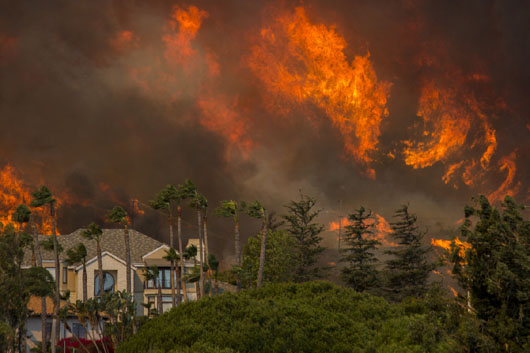by WorldTribune Staff, November 12, 2018
While the Left has been quick to attribute the deadly California wildfires to climate change, forestry analysts say poor land management and environmental regulations which limited logging are the main reasons behind the increase in devastating wildfires.
Gov. Jerry Brown said wildfires were part of a “new normal” because of global warming.

The Sacramento Bee editorial board said “This is climate change, for real and in real time. We were warned that the atmospheric buildup of man-made greenhouse gas would eventually be an existential threat.”
But Forester Bob Zybach said he warned government officials decades ago that allowing forests to grow unchecked by proper management would result in catastrophic wildfires.
Zybach said the Clinton administration in 1994 introduced a plan to protect old growth trees and spotted owls by strictly limiting logging.
That plan, Zybach said, ignored history and would fuel “wildfires reminiscent of the Tillamook burn, the 1910 fires and the Yellowstone fire.”
“We knew exactly what would happen if we just walked away,” Zybach, an experienced forester with a PhD in environmental science, told The Daily Caller.
President Donald Trump tweeted on Nov. 10: “There is no reason for these massive, deadly and costly forest fires in California except that forest management is so poor.”
Trump said he may restrict California’s wildfire funding if actions aren’t taken to limit fires.
In a recent tweet, Interior Secretary Ryan Zinke said: “Fires across the west are burning hotter and more intense. The overload of dead and diseased timber in the forests makes the fires worse and more deadly. We must be able to actively manage our forests and not face frivolous litigation when we try to remove these fuels.”
University of Washington climate scientist Cliff Mass told The Daily Caller that “Many of the media and some politicians have been pushing a false narrative: that the fires are mainly about global warming. They are not.”
Mass added: “Global warming may contribute slightly, but the key factors are mismanaged forests, years of fire suppression, increased population, people living where they should not, invasive flammable species, and the fact that California has always had fire.”
Chuck DeVore, a former California assemblyman who served in the California Army National Guard for two decades, said the problem with the narrative that global warming is to blame for the fires is that making a passionate argument is no substitute for the truth.
“Some two decades ago, California produced so much wood waste from its timber operations, including brush and small trees from thinning efforts, that the resulting renewable biomass powered electric generating plants across the length of the state,” DeVore wrote for Forbes. “But cheap, subsidized solar power, combined with air quality concerns (wood doesn’t burn as cleanly as natural gas) and a lack of fuel due to cutbacks in logging, led to the closure of many biomass generators. What used to be burned safely in power generators is now burned in catastrophic fires. Including the growing capture and use of landfill methane as a fuel, California’s biomass energy generation last year was 22 percent lower than it was 25 years before.”
The issue was summarized by the Western Governors’ Association in their 2006 Biomass Task Force Report which noted:
“…over time the fire-prone forests that were not thinned, burn in uncharacteristically destructive wildfires, and the resulting loss of forest carbon is much greater than would occur if the forest had been thinned before fire moved through. …failing to thin leads to a greater greenhouse gas burden than the thinning created in the first place, and that doesn’t even account for the avoided fossil fuel greenhouse gas emissions due to the production of energy from the forest thinnings. In the long term, leaving forests overgrown and prone to unnaturally destructive wildfires means there will be significantly less biomass on the ground, and more greenhouse gases in the atmosphere”
DeVore concluded that: “Whether global climate change is a problem that can be solved by California is a dubious proposition – one year’s worth of emission growth in China is greater than California’s total emissions. But the action needed to reduce the state’s growing forest fire threat would be the same regardless of one’s belief in any problems posed by climate change: start managing our forests again.”
Subscribe to Geostrategy-Direct __________ Support Free Press Foundation
